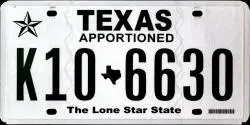Texas Apportioned Plates

The International Registration Plan (IRP) is an agreement among U.S. states and Canadian provinces that allows commercial vehicles traveling across multiple jurisdictions to operate under one set of apportioned license plates. Instead of registering in every state, carriers can register in Texas and legally operate interstate, with fees distributed to each jurisdiction based on actual miles driven. For carriers based in Texas, securing IRP registration is essential to keep operations compliant, efficient, and free of costly trip permits.
Who Needs IRP Registration
You’ll need Texas IRP registration if your commercial vehicle travels across state lines and meets one of the following requirements:
- Vehicles with a gross vehicle weight rating (GVWR) over 26,000 pounds.
- Vehicles with three or more axles, regardless of weight.
- Fleets made up of vehicles operating interstate that together exceed 26,000 pounds combined GVWR.
- Any qualifying truck or tractor-trailer combination operating for hire across state borders.
Required Documents for Texas IRP Registration

While IRP works for all of its member jurisdictions, not every trucker in Texas needs to purchase IRP apportionment. You only need IRP if you intend to leave the state of Texas on a transport run and if your truck meets one or more of the following parameters:
- It has a GVWR (Gross Vehicle Weight Rating) of 26,000 pounds or more
- It has three or more axels
- You use it in combination, and the combination exceeds 26,000 pounds
How Do I Get IRP?
When applying for IRP in Texas, carriers must provide a set of documents to establish eligibility. Proof of business establishment in Texas is required, such as a lease agreement or utility bill, along with a Texas-issued identification for the owner or principal.
Applicants must also present vehicle titles, ownership documents, and current proof of insurance. For vehicles weighing 55,000 pounds or more, proof of payment of the Heavy Vehicle Use Tax (IRS Form 2290) is necessary. In addition, accurate odometer readings and mileage records must be submitted, along with USDOT and Motor Carrier numbers when applicable. Accuracy and completeness are critical, as missing or incorrect documentation can delay approval.
How to Apply for Texas IRP
The Texas Department of Motor Vehicles (TxDMV) manages apportioned registration, and the process can be completed online or in person. The first step is setting up a TxFLEET account through the TxDMV portal. Once the account is active, applicants must complete the IRP application form with detailed fleet and mileage information.
All required documents are then submitted, either online or at a TxDMV office, followed by payment of apportioned registration fees. Upon approval, the applicant receives apportioned license plates and cab cards, which allow the fleet to operate legally across state and provincial borders. The online system offers the fastest way to process applications, though in-person service remains available for new registrants.
IRP Compliance Audits
As an apportioned carrier, you are required to maintain detailed operational records in order to renew your apportioned registration each year. To ensure accuracy and fairness in fee distribution, base jurisdictions are required to audit an average of 3% of renewed fleets annually. This process verifies that proper revenues are being collected for each jurisdiction where your fleet operates. As a result, every motor carrier registered with the Texas IRP may be subject to a compliance examination of their operational records.
Apportioned tow trucks have an additional requirement, they must also maintain registration through the Texas Department of Licensing and Regulation (TDLR).
In addition, legislative changes have affected inspection requirements. Under House Bill 2305, passed during the 83rd legislative session, the State of Texas eliminated inspection stickers and introduced the “Two Steps, One Sticker” program. Since March 1, 2015, commercial vehicles no longer receive an inspection sticker. Instead, the cab card or registration receipt serves as proof of both inspection and registration.
IRP Renewal Process
Texas IRP registration must be renewed annually, and carriers must stay on top of deadlines to avoid penalties. Renewal requires submitting updated mileage records for the reporting period, proof of continued insurance coverage, and any changes to the fleet, such as added or removed vehicles.
Fees must be paid through the TxIRP portal, after which updated credentials are issued. Failure to renew on time can result in fines, suspension of apportioned plates, and disruptions to interstate operations.
Maintaining accurate mileage records is critical not only for renewal but also for compliance across all jurisdictions. Records must account for every mile traveled, whether loaded, empty, or bobtail. Carriers are also encouraged to coordinate IRP renewal with IFTA (International Fuel Tax Agreement) filing to streamline compliance requirements. This ensures consistency between mileage and fuel use reporting while reducing the chance of errors or audits.
Get Your Texas IRP With Us
Securing IRP registration in Texas does not have to be stressful or confusing. Our team specializes in guiding carriers through the process quickly and accurately, ensuring that all required documents are complete and submitted properly the first time. By working with us, you can avoid costly mistakes, prevent delays, and keep your fleet on the road without unnecessary interruptions.
We pride ourselves on fast processing, expert guidance, and dedicated customer support tailored to the unique requirements of Texas IRP. Whether you are applying for the first time or renewing your annual registration, our specialists will make sure your paperwork is handled with precision and care. Call us today at (888) 202-4927 to get started. Let us take care of your IRP needs so you can focus on running your business.
